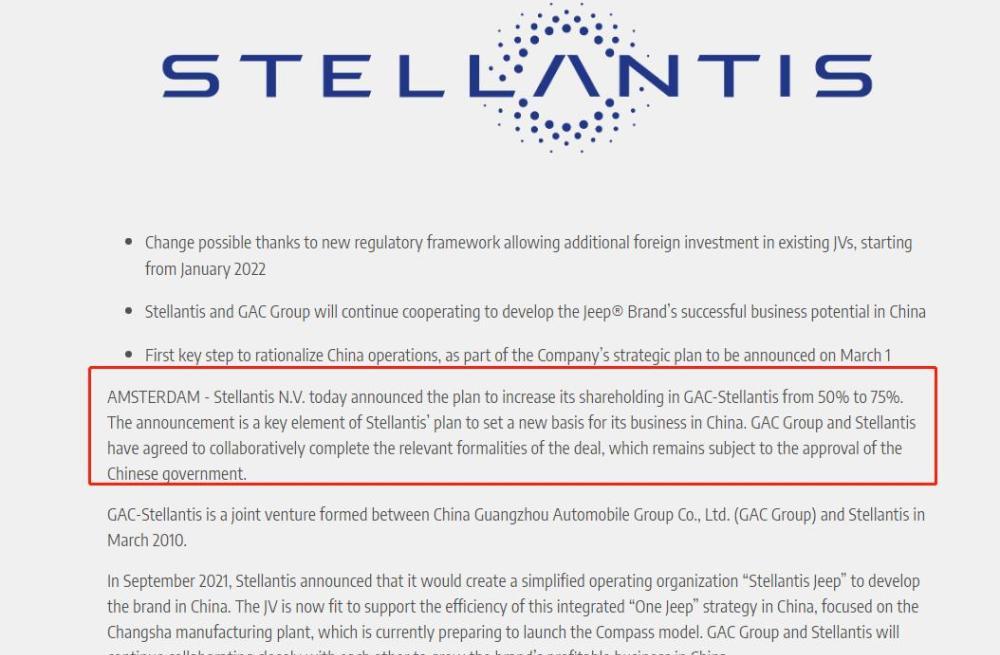The ancients had a saying: Husband and wife are originally birds in the same forest, and they fly separately in the face of great trouble. Probably means that husband and wife can enjoy wealth together, but they cannot share hardships, and when the great trouble comes, each person thinks in his heart how to escape from this disaster.
Husbands and wives are more like this, when it comes to the business field, the partners are not happy and dispersed, and even turn against each other in the court, that is even more common.
And such a thing, in the future, may be frequently played out in domestic joint venture car companies.

On January 27, Stellantis announced on its official website that it plans to increase the shareholding ratio of the domestic joint venture GAC FCA from 50% to 75%, and GAC Group and Stellantis have agreed to cooperate to complete the procedures related to the transaction, but still need the approval of the Chinese government.
This seemingly normal news was immediately denied by the GAC Group after it was released.
GAC Group announced on its official website that GAC Group learned from the official website of Stellantis about its release on the equity adjustment of GAC FCA. This announcement is not approved by us, and GAC Group deeply regrets it. Regarding foreign joint venture cooperation, GAC Group will promote in strict accordance with national laws, regulations and policies, adhering to the principle of mutual trust and win-win results.
Such a major oolong, both sides are still announcing the news on the official occasion, obviously the story inside is not simple, but the specific details of the internal competition are probably only known to the shareholders themselves.
All along, the reason why domestic joint venture car companies can maintain relatively stable development regardless of the efficiency, and there are few "fights" between the two shareholders, in fact, stems from the "Automobile Industry Policy" issued by the mainland in 1994.
In this policy, it restricts foreign investors from holding more than 50% of their shares in joint ventures, and the same type of vehicle products cannot establish more than two production enterprises.
That is to say, no matter how much foreign brand you are, as long as you want to make money in China, you must partner with the Chinese side to establish a joint venture company, and you must also be restrained by the Chinese side.
But such a situation has become a thing of the past.
In 2018, the National Development and Reform Commission announced that the restrictions on foreign ownership of special vehicles and new energy vehicles in China will be abolished in the same year; the restrictions on foreign ownership of commercial vehicles will be abolished in 2020; the restrictions on foreign ownership of passenger cars will be abolished in 2022, and the restrictions on no more than 2 joint ventures will be abolished.
With the 5-year transition period having passed, this year has become the first year when foreign capital is no longer restricted by the equity ratio, and naturally many people have begun to sit still.
As the world's largest automobile market, China's largest volume can be said to be unlimited business opportunities.
But if there is pride, there will naturally be frustration.
For those joint venture brands that have been selling well, the contradiction between the Chinese side and the foreign party may not be so big.
But some car brands, obviously in the country to sell well, to China suddenly do not accept the soil, consumers just do not recognize.
There are also some that have experienced glory in the first few years of rough development in China's auto market, but with the intensification of competition, they have gradually declined.
All of the above often requires someone to "carry the pot", such as the Chinese side believes that the foreign products are not good, the foreign side believes that the Chinese side's propaganda is not in place, etc., and it is inevitable that there will be estrangement.
With the relaxation of foreign equity restrictions, some foreign parties will naturally have their own idea of "going it alone".
GAC FCA is currently operating the Jeep brand in China, and in recent years, the situation of Jeep is not optimistic, especially the overall shrinkage of the market share of domestic models, which has made it more and more difficult for Jeep to gain a foothold in the joint venture brand echelon.
Since cooperation is not good, self-leadership may be a good strategy that Stellantis thinks can turn things around.
In fact, before GAC FCA, there have been many joint venture car companies have begun to act, in addition to BMW Brilliance, JAC Volkswagen, such as foreign strength is far greater than the Chinese side, one-sided, and GAC FCA similar situation to Dongfeng Yueda Kia has also been officially announced before, holding 25% of the equity of Dongfeng Group to withdraw, Yueda and Kia Specific equity distribution has not been announced.
Compared with the above good points, happy signing, Stellantis and GAC Group's negotiations against GAC FCA, it can be seen that it is obviously not pleasant.
It is foreseeable that this kind of similar quarrel will happen later.
So who will be next? I can't help but want to continue eating melon.